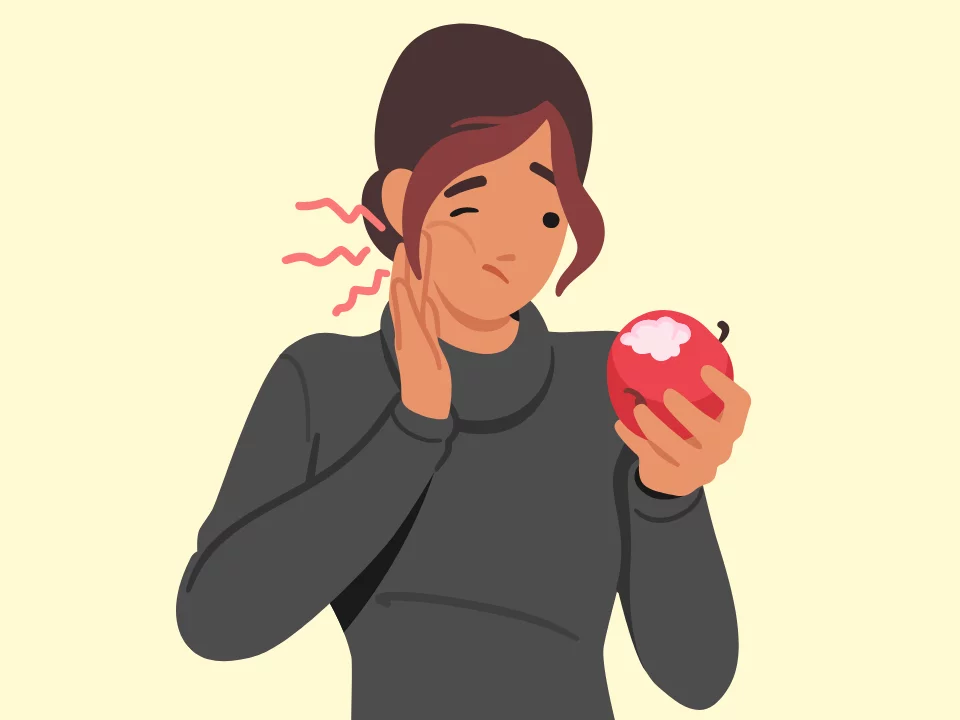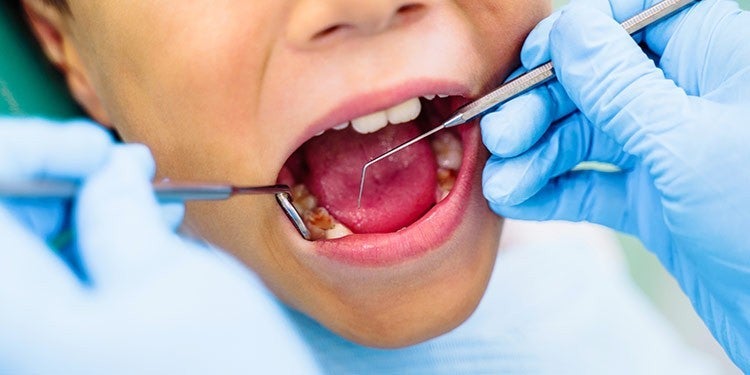What Is a Toothache?
What Does a Toothache Feel Like?
Toothache Symptoms
- Tooth or jaw pain that stems from chewing
- Tooth sensitivity to hot, cold, sweet, or sour foods and drinks
- Headaches
- Tooth or jaw swelling
- Bad breath
- Fever
- Swollen glands
- Trauma or injury to the mouth
What Are Some Toothache Causes?
- Cavities
- Damaged tooth filling
- Broken tooth
- Abscessed tooth
- Infected gums
- Tooth eruption from the gum
- Tooth extraction
- Tooth sensitivity
- Temporomandibular disorder
- Grinding or clenching teeth
- Repetitive mouth motions such as chewing
- Accumulation of food particles between teeth
- Sinusitis
Can a Toothache Cause a Headache?
Can a Toothache Cause a Fever?
Can a Toothache Cause Ear Pain?
When Is Tooth Pain Serious?
- Fever symptoms – A high fever or chills potentially means you have an infection that will require an antibiotic.
- Facial rash – A rash on your face that’s caused by a toothache will require some sort of medication that should be determined by a physician.
- Head or face injury – Any head or facial injury that brings about nausea, vomiting, a headache, or lightheadedness can be signs of a more serious injury.
- Medical history – A history of chest pains, heart disease, or physical trauma should be brought to the attention of a medical professional immediately.
- Jaw pain and chest pain – These two symptoms together can signify a heart attack or angina as the jaw pain can be referred pain.
- Difficulty swallowing or bleeding gums – People with weakened immune systems, diabetes, or steroid use could be suffering from a serious infection.
- Broken or lost teeth – Any injury that results in broken or knocked-out teeth is considered serious. A swallowed tooth or a permanently lost tooth are classified as dental emergencies.
When Should I See a Dentist About a Toothache?
- If the toothache lasts longer than one to two days
- The toothache pain is severe
- Your face or mouth becomes swollen
- You develop a fever or earache
- Opening your mouth wide is painful
- You have a broken tooth
Toothache Treatments
Cavities
Root canal
A root canal might be necessary if the tooth’s pulp is infected. Bacteria that penetrates a tooth’s nerve can bring about the need for a root canal.
Antibiotics
- Cold compress – Hold an ice pack wrapped in a towel to the pained area. This will reduce swelling. Ice for 20-minute periods every few hours.
- Medications – Try an over-the-counter pain medication such as aspirin, ibuprofen, naproxen, or acetaminophen. These medications possess anti-inflammatory properties.
- Rinses – There are a couple of options for rinsing. Warm salt water will loosen tooth debris while reducing inflammation. You can also rinse with hydrogen peroxide (3% solution) to reduce inflammation and minimize pain.
- Garlic – Apply a crushed garlic clove paste to the affected area. Garlic relieves pain and kills bacteria.
- Vanilla extract – Vanilla extract contains antioxidants for healing and alcohol to numb the pain. Apply it several times each day.
- Peppermint tea – Apply a warm peppermint tea bag to the affected tooth and gum. The soothing qualities of peppermint will provide pain relief.
- Clove oil – Clove oil is a natural antiseptic that reduces inflammation while numbing pain.
What Happens When I See a Dentist About a Toothache?
Seeking dental treatment is necessary when toothache pain is severe enough. So start by scheduling a checkup with your dentist.
Toothache Prevention
Toothache prevention starts with practicing a healthy oral care regimen. That means brushing multiple times each day complemented by flossing. Use a toothpaste that contains fluoride and rinse with an antiseptic mouth wash. Don't forget to schedule regular teeth cleanings too.
Visit a Dentist Near You for Toothaches
Consult your dentist to discuss the best methods for cavity prevention or if you’re suffering from cavity symptoms. Or, if you're asking how to find a dentist near me check out The Smile Generation to find a dentist near you for your toothache prevention and treatment needs. You can read patient reviews, peruse staff bios, and schedule an appointment online with a click of your mouse.
Find your trusted, local dentist today!
Sources
- https://my.clevelandclinic.org/health/diseases/10957-toothache
- https://www.webmd.com/oral-health/toothache
- https://www.webmd.com/oral-health/guide/toothaches
- https://www.dbcusa.org/toothache-and-ear-pain-in-the-same-side/
- https://www.colgate.com/en-us/oral-health/tooth-sensitivity/potential-causes-of-toothaches-its-not-always-a-cavity
- https://www.healthline.com/health/symptoms-of-tooth-infection-spreading-to-body
- https://www.colgate.com/en-us/oral-health/respiratory-conditions/chronic-sinusitis-symptoms-effects
- https://www.healthline.com/health/toothaches
- https://www.colgate.com/en-us/oral-health/respiratory-conditions/why-do-my-teeth-hurt
- https://www.colgate.com/en-us/oral-health/adult-oral-care/what-is-referred-tooth-pain
- https://www.mayoclinic.org/first-aid/first-aid-toothache/basics/art-20056628
Smile Generation blog articles are reviewed by a licensed dental professional before publishing. However, we present this information for educational purposes only with the intent to promote readers’ understanding of oral health and oral healthcare treatment options and technology. We do not intend for our blog content to substitute for professional dental care and clinical advice, diagnosis, or treatment planning provided by a licensed dental professional. Smile Generation always recommends seeking the advice of a dentist, physician, or other licensed healthcare professional for a dental or medical condition or treatment.








